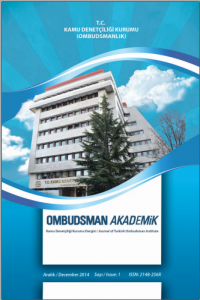Öz
Müzakere, arabuluculuk ve
ombudsmanlık gibi mahkeme formalitesi dışında, ve gönüllülük esasına dayanan
alternatif uyuşmazlık çözme yöntemlerinin kullandığı yöntemler tüm dünyada
benzerlik göstermektedir. Bir arabulucunun veya ombudsmanın nasıl bir süreç
yöneteceği, ihtilafları çözmek için ne gibi teknikler kullanacağı konusunda
birçok ülkede bunları uygulayan profesyoneller tarafından benimsenmiş ortak
anlayışlar mevcuttur. Bu anlamda ortak normların, tekniklerin ve uygulamanın
gelişip evrenselleşmesi görülürken, yine de her müzakere belli bir kültürel
bağlam içinde gerçekleşmekte. Farklı kültürel bağlamların müzakere,
arabuluculuk, ombudsmanlık ve benzeri alternatif uyuşmazlık çözme süreçlerini
nasıl etkilediği ise oldukça karmaşık ve tartışılan bir konudur. Kültürün bu
süreçler üzerindeki etkisi nasıl kavramsallaştırılabilir? Kültür kavramını
çatışma çözme ve müzakere süreçlerine nasıl entegre edebiliriz ve bu hangi
kuramsal yaklaşımlarla mümkündür? Bu makale bu ve bunun gibi sorulara yanıt
aramakta; bu sorulara kuramsal düzeyde bir cevap bulmaya çalışırken somut
örnekler sunmaktadır.
Anahtar Kelimeler
Kaynakça
- Avruch, K. (1998). Culture and Conflict Resolution. Washington, D.C., United States Institute of Peace Press. Avruch, K. (2003) Culture, Conflict. S. Cheldelin, D. Druckman, ve L. Fast (der.) London ve New York: Continuum. Bercovitch, J. ve O. Elgstrom (2001) Culture and International Mediation: Exploring Theoretical and Empirical Linkages, International Negotiation, 6: 3-23. Chataway, Cynthia. (1998). “Track II Diplomacy: From a Track I Perspective” Negotiation Journal, July: 269-285. Cloke, Kenneth. "The Culture of Mediation: Settlement vs. Resolution." Beyond Intractability. Eds. Guy Burgess and Heidi Burgess. Conflict Research Consortium, University of Colorado, Boulder. Posted: December 2005 http://www.beyondintractability.org/essay/culture_of_mediation. Cohen, R. (1993). An Advocate's View. Culture and Negotiation: The Resolution of Water Disputes. G. O.a. R. Faure, Jeffrey Z Rubin (der.) London, Sage Publications: 22-37. Cohen, R. (1997). Negotiating Across Cultures. Washington, D.C., USIP Press. Çuhadar, Esra (2009) “Çatışma Ortamlarında Üçüncü Şahısların Uzlaşma Amaçlı Müdahaleleri ve Çeşitleri,” Beriker, Nimet (der.) Çatışmadan Uzlaşmaya: Kuramlar, Süreçler ve Uygulama. Bilgi Univ. Yayınları. Cunningham, Robert B. & Yasin K. Sarayrah (1993). Wasta: The Hidden Force in Middle Eastern Society. Westport, CN: Praeger. D'Andrade, Roy G. and Claudia Strauss. (1992) Human Motives and Cultural Models. Cambridge, UK: Cambridge University Press. De Rivera, J. (2009) Teaching about culture of peace as an approach to peace education. Salomon, G. ve E. Cairns (der.) Handbook on Peace Education. New York: Psychology Press. Ellis, D. ve Ifat Maoz 2003 A Communication and Cultural Codes Approach to Ethnonational Conflict, International Journal of Conflict Management, 14 (3-4). Faure, G. O., Jeffrey Z. Rubin (1993). (der.) Lessons for Theory and Research. Culture and Negotiation: The Resolution of Water Disputes. London, Sage Publications: 209-231. Fisher, R. J. (1997). Interactive Conflict Resolution. Peacemaking in International Conflict. W. a. L. R. Zartman. Washington, D.C., USIP Press: 239-272. Gelfand, M. J. ve Realo, A. (1999). Individualism-collecitivism and accountability in intergroup negotiations. Journal of Applied Psychology, 84 (5): 721-736. Gulliver, P. H. (1979). Disputes and Negotiations: A Cross-Cultural Perspective. New York, Academic Press. Hall, E. ve M. R. Hall. (1990). Understanding Cultural Differences. Yarmouth, Intercultural Press. Hofstede, G. (1989) Cultural predictors of national negotiation styles". F. Mautner-Markhof (Der.),Processes of International Negotiations. Boulder, Colorado, Westview Press, 193-201. Hofstede, G. (2001) Culture's Consequences: Comparing Values, Behaviors, Institutions and Organizations Across Nations, 2nd Edition. Thousand Oaks CA: Sage Publications. Irani, George.(2000) "Rituals of Reconciliation: Arab-Islamic Perspectives." Mind and Human Interaction 11 (4) (2000): 226-45. Köse, Talha ve Nimet Beriker. (2012). Islamic Mediation in Turkey: The Role of Ulema. Negotiation and Conflict Management Research, Volume 5, Issue 2, pages 136–161. Lang, W. (1993). A Professional's View. Culture and Negotiation: The Resolution of Water Disputes. G. O.a. R. Faure, Jeffrey Z. London, Sage Publications: 38-46. Lederach, J. P. (1995). Preparing for Peace: Conflict Transformation Across Cultures. Syracuse,Syracuse University Press. Ross, M. (1995). Psychocultural Interpretation Theory and Peacemaking in Ethnic Conflicts, Political Psychology, 16 (3): 523-544. Rubinstein, Robert A. (2003). ‘Cross-Cultural Considerations in Complex Peace Operations’,Negotiation Journal 19(1): 29–49. Rubinstein, R. (2008) Peacekeeping Under Fire. Boulder ve London: Paradigm Publishers. Salomon, G. ve E. Cairns (2009). (der.) Handbook on Peace Education. New York: Psychology Press. Sargut, Selami. (1994)Bireycilik ve Ortaklaa Davranı kileminde Yönetim ve Örgüt Kuramları,A.Ü. Siyasal Bilgiler Fakültesi Dergisi, 49 (1). Schecter, J. (1998) Russian Negotiating Behavior: Continuity and Transition. Washington DC, USIP Press. Thomson, Leigh. (2009) The Mind and Heart of the Negotiator. New Jersey, Prentice Hall (third edition). Wall, J. A., ve Blum, M. E. (1991). Community mediation in the People’s Republic of China.Journal of Conflict Resolution, 35, 3-20. Wall, J. Jr., Nimet Beriker andSharon Wu (2010) Turkish Community Mediation. Journal of Applied Social Psychology, Volume 40, Issue 8, pages 2019–2042. Wu, Xiaohui (Anne) and Cheng (Jason) Qian. "Culture of China's Mediation in Regional and International Affairs." Conflict Resolution Quarterly 28, no. 1 (Forthcoming October 2010). Zartman, W. (1993). A Skeptic's View. Culture and Negotiation: The Resolution of Water Disputes. G. O. a.R. Faure, Jeffrey Z. London, Sage Publications: 17-21.
Ayrıntılar
| Birincil Dil | Türkçe |
|---|---|
| Bölüm | Yıl 2014 Sayı 1 |
| Yazarlar | |
| Yayımlanma Tarihi | 31 Aralık 2014 |
| Kabul Tarihi | 3 Aralık 2014 |
| Yayımlandığı Sayı | Yıl 2014 Sayı: 1 |


